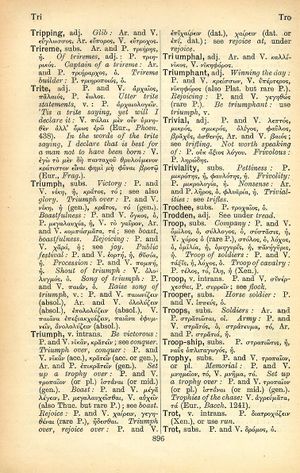trite: Difference between revisions
Ἐλεεινότατόν μοι φαίνετ' ἀτυχία φίλου → Miseria amici mihi suprema est miseria → Am meisten Mitleid, scheint's, heischt eines Freundes Leid
(D_9) |
(3_13) |
||
| Line 15: | Line 15: | ||
{{Gaffiot | {{Gaffiot | ||
|gf=(1) <b>trĭtē</b>, ēs, f. (τρίτη), troisième corde d’un instrument de musique : Vitr. Arch. 5, 4, 5 ; Ps. Censor. Frg. 12, 5 || tierce [musique] : Vitr. | |gf=(1) <b>trĭtē</b>, ēs, f. (τρίτη), troisième corde d’un instrument de musique : Vitr. Arch. 5, 4, 5 ; Ps. Censor. Frg. 12, 5 || tierce [musique] : Vitr. | ||
}} | |||
{{Georges | |||
|georg=tritē, ēs, f. (τρίτη), in der [[Musik]] = die Terz, [[trite]] [[synemmenon]], das e, [[trite]] [[diezeugmenon]], das eingestrichene e, [[trite]] hyperbolaeon, das eingestrichene f., Vitr. 5, 4, 5. Censor. fr. 12, 3. | |||
}} | }} | ||
Revision as of 09:08, 15 August 2017
English > Greek (Woodhouse)
adj.
P. and V. ἀρχαῖος, παλαιός, P. ἕωλος.
Utter trite statements, v.: P. ἀρχαιολογεῖν.
'Tis a trite saying, yet will I declare it: V. πάλαι μὲν οὖν ὑμνηθὲν ἀλλʼ ὅμως ἐρῶ (Eur., Phoen. 438).
In the words of the trite saying, I declare that is best for a man not to have been born: V. ἐγὼ τὸ μὲν δὴ πανταχοῦ θρυλούμενον κράτιστον εἶναι φημὶ μὴ φῦναι βροτῷ (Eur., Frag.).
Latin > English (Lewis & Short)
trĭtē: ēs, f., = τρίτη; in music,
I the third string or tone in the musical scale, Vitr. 5, 4.
Latin > French (Gaffiot 2016)
(1) trĭtē, ēs, f. (τρίτη), troisième corde d’un instrument de musique : Vitr. Arch. 5, 4, 5 ; Ps. Censor. Frg. 12, 5 || tierce [musique] : Vitr.
Latin > German (Georges)
tritē, ēs, f. (τρίτη), in der Musik = die Terz, trite synemmenon, das e, trite diezeugmenon, das eingestrichene e, trite hyperbolaeon, das eingestrichene f., Vitr. 5, 4, 5. Censor. fr. 12, 3.

